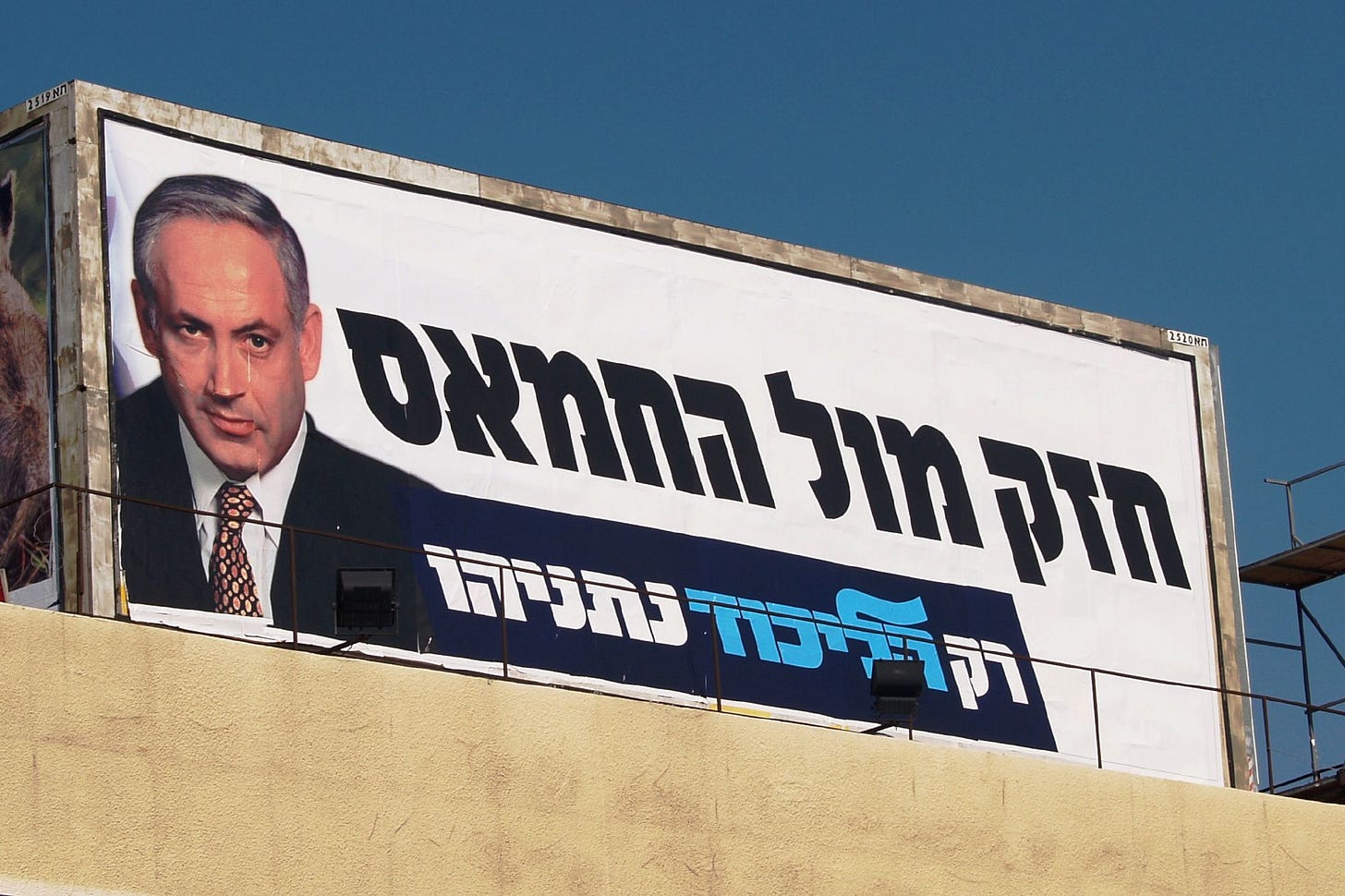Why Matthew Syed is wrong about Gaza
Sometimes even friends of Israel can produce bad analysis.
As the war in Gaza grinds agonisingly on, the resilience of those with sound judgment is inevitably being eroded by the relentless propaganda. The latest of these, perhaps, is Times columnist Matthew Syed. He is, of course, an excellent writer and has written a number of very solid columns on Israel. His latest? Not so much.
Beneath the headline “what we see in Gaza is rekindling jihad. Netanyahu must be stopped” nestles a tightly-argued and eloquent argument that will be taken as tonic by Bibi-haters everywhere. As sophisticated as it may be, however, it rests upon assumptions that are either misguided or downright fanciful.
Before we get into the faults with the column, let me try to summarise its argument. It boils down to these main points:
Israel’s campaign is fostering antisemitism around the world and fuelling a rise in jihadism, which will only create more violence in the future;
Nazi Germany was defeated by military force because it was confined to Germany, whereas jihadism is global so cannot be beaten using bombs;
The war has made Israel “not stronger but ever more fragile, having obliterated its reputation in the global south and Middle East, not to mention once-sympathetic opinion across the West”;
If Israel had acted with “restraint” after October 7, peace with Saudi Arabia would have been assured, Iran would have been “isolated as never before”, funding for Hamas would have “dried up” and fundamentalism would have been “starved of oxygen”;
The hostages could have been released by “releasing more fanatics from Israeli prisons” which would have been “infinitely better” than creating more through radicalisation;
By not fighting so aggressively, Israel would have provided “the antidote to terrorism”, strengthening the Abraham Accords and producing “Rationality. Reason. Trade. Peace. Growth”;
“Restraint” would have made Hamas look “ludicrous” in the eyes of “younger Arabs”, depriving fanaticism of the fuel of misery;
The “endgame” in Gaza remains unclear, so Netanyahu is aiming “to pen two million desperate people into an open-air prison and oversee a ‘voluntary’ exodus, perhaps via the expedient of more bombing or another blockade”;
All has been “masterminded by a PM who has every incentive to perpetuate this heartbreaking slaughter to delay his trial for corruption”.
So there you have it, folks. Restraint! Why hasn’t Israel ever thought of that? Syed even stooped to the “open-air prison” line, despite the fact that 10,000 Palestinians a day crossed from Gaza into Israel daily for work before October 7 (and the Strip has a border with Egypt).
Let’s dive in. To start with, although Syed is correct that antisemitism and Israelophobia has risen worldwide, it is deeply incorrect to suggest that Israel is “not stronger but ever more fragile”.
Yahya Sinwar, Hassan Nasrallah, Ismail Haniyeh and countless other terrorist leaders in Lebanon, Gaza and elsewhere lie dead. Hezbollah is so degraded that it did not fire a single rocket when Israel fought Iran. Hamas is almost defeated, reduced from a light infantry outfit to a rump guerrilla operation of teenagers with IEDs.
Iran has no air defences, no nuclear scientists, no top brass, far fewer ballistic missiles and no nuclear programme. Assad is no more (though as we have seen in recent days, Syria remains a deeply unhappy place). Indeed, aside from the realm of public relations, Israel has not been so mighty since 1967.
Don’t get me wrong, the reputational damage is very worrying. As Golda Meir famously put it, however, “if we have to have a choice between being dead and pitied, and being alive with a bad image, we’d rather be alive and have the bad image”.
For all the risk attached to the aggravation of jihadism in response to Israel’s victories, that is better than the alternative. Had Israel followed Syed’s recommendation for “restraint”, Sinwar, Nasrallah and the rest would still be alive, their troops still armed to the teeth. Hamas would still be strong in Gaza, and many more hostages would remain in the catacombs.
Israel would be – as it was on October 6 – on the very brink of destruction.
Look back at the ceasefire deals that have been agreed over the past 21 months. All of them have come after intense Israeli military pressure forced Hamas to the negotiating table. What makes Syed so certain that releasing that pressure would have coaxed Hamas into releasing their captives out of the goodness of their hearts?
The hostages are Hamas’s best playing card. This has always been the case, ever since Gilad Shalit. Their release will not come by way of flattery. They will have to be prised out of the grasp of Hamas with a boot across the enemy’s jugular.
Netanyahu’s two war aims – victory over Hamas and the return of the hostages – must be achieved. The alternative is too awful to contemplate. Without the hostages, Israeli society will never have closure. And if Israel were to withdraw before the defeat of Hamas, further kidnappings, rocket attacks, atrocities and wars would be certain.
After the wake-up call of October 7, short-termism is no longer viable. The current campaign is a question of resilience now for peace in the long term. Syed insists that “terrorist networks are replacing dead Hamas fighters at a rate of five to one”, but this is a deceptive argument.
One of the centres of the conflict in northern Gaza has seen Hamas forces led by four different commanders, as one by one they have been picked off by Israel. The latest one is just 19 years old. That is characteristic of the predicament of Hamas.
Sadly, there is no shortage of brainwashed millennials in Gaza who are willing to pick up a Kalashnikov and kill Jews. There is a great shortage, however, of experienced military commanders. Hamas has been transformed from a well-trained and well-organised fighting machine into a mob of young and inexpert fanatics.
Which brings us to the Nazi Germany comparison. What Syed ignores is the role denazification played in the rehabilitation of Germany (and the similar programme which took place in Japan). After victory was won, the de-brainwashing project was both ruthless and intense, ensuring that the ideology died along with the war machine.
Of course, there remain Nazis to this day. But they do not control an army. That’s the difference. Similarly, Hamas must be deprived of control of Gaza and its benighted population must be deradicalised, so that one day there may be fewer brainwashed millennials with Kalashnikovs.
But first comes victory. Although it would be sweet if the hearts and minds of terrorist fanatics could be won with “restraint”, history shows that sometimes the only “antidote to terrorism” is military force. The contention that leaving Hamas in power would make it appear “ludicrous” to people in Gaza is ludicrous in itself.
Similarly, the suggestion that pulling out of the Strip with the jihadis still in charge and the hostages still in captivity would have magically secured a peace deal with the Saudis, the isolation of Iran, the “drying up” of funding for Hamas and the suffocation of fundamentalism is laughable. These are jihadis, not the Tombliboos.

In truth, “Rationality. Reason. Trade. Peace. Growth” have been tried with the Palestinians already. Israel withdrew unilaterally from Gaza in 2005, leaving all the infrastructure and businesses behind. This was duly destroyed in a frenzy of hatred.
Hamas came to power and commenced to spend all its income on terror tunnels and militants. Nonetheless, Israel allowed thousands of civilians into its territory daily to work, so that the economy could be buoyed and terrorism would become less attractive. For this reason, it also allowed Qatari money into the Strip.
Even power and water was supplied, and medical care to the seriously ill. How did all this turn out? Did Hamas come to be seen as “ludicrous”? Was its funding cut off? Did “younger Arabs” turn to peace? Was Iran “isolated”? Did Gaza lost its appetite for Jewish genocide? Of course not. You might as well try to beat Islamic State with an order from Interflora.
This is where the question of the “endgame” comes in. Israel is almost at the point where its regional dominance is reasserted, its deterrence restored. This strength is what attracts alliances, not sending hugs.
While it is true that the moderate Arab countries cannot rush into the Abraham Accords with their populations whipped up into such sulphurous temper by Al Jazeera, when the Gaza war is over, is is likely that they will make the move. With Iran down but not out, it is in their interests more clearly than ever.
Perhaps an end to the hostilities could be packaged as a Saudi diplomatic breakthrough, paving the way to Riyadh joining the Abraham Accords. This would be of great benefit in reconstructing Gaza.
While it is true that there is no obvious governing body for the Strip – the Palestinian Authority is incompetent, corrupt and brutal, rewards terrorism and is hated by its own people – Palestinian ineptitude and radicalism is hardly Israel’s fault.
From Jerusalem’s point of view, the job is clear: destroy Hamas, get the hostages home, then work with regional powers to find a resolution in Gaza that places deradicalisation at the heart of a new plan. And if civilians want to leave the Strip to start new lives elsewhere, why not? Why is it “refugees welcome” for Syrians but “stay the hell there” for Gazans?
Look, I get it. Like Syed, I wish that the world was a better place. I wish the jihadis weren’t jihadis but were rational human beings. I wish they just wanted the best for their children, rather than trying to sacrifice them in the service of a death cult. Perhaps that is the real tragedy of his column.



JWS, a well constructed and written response to deluded Syed.
Let no one forget that Gaza has been free of Israelis for nearly 20 years.
Whilst 95% of media outlets are shouting for Israel need to be restrained, the very simple act by Hamas, of releasing the hostages and surrendering, would being closure.
The media need to call for Hamas to surrender and release the hostages 🎗️🎗️
Israelophobic apologetics are getting more sophisticated; thanks for the "heads up" Jake.
We know now what to expect. Forewarned is forearmed; thank-you.